Jane Cox: Art, Academia & Financial Reality (Part 2 of 2)

This episode is Part 2 of host Ethan Steimel’s conversation with award-winning lighting designer and Princeton professor Jane Cox. In Part 1 (Episode 192), Jane shared her journey through financial instability, student loan struggles, and the decision to pursue a full-time academic role. In this follow-up, Ethan dives deeper into the economics of design—covering hourly pay, production budgets, retirement planning, and how Jane uses her platform to support emerging artists and community initiatives. If you haven’t heard Part 1 yet, it’s worth going back—but this episode also stands strong on its own.
Should theater designers be paid hourly instead of a flat fee?
Absolutely, yes. I’ve been advocating for years that theater designers—especially lighting designers—should be paid by the hour. It’s how moving light programmers and many other industry professionals are compensated. Designers often subsidize productions by working countless unpaid hours, especially in prep and drafting phases. We tested hourly pay during a Princeton project and paid $50/hour with a cap. It felt ethical and transparent, and the designer knew their time was valued.
Do you still have to pay out-of-pocket for assistants and drafting?
Unfortunately, yes. Especially outside of Broadway, theaters often provide limited or no budget for drafting or assistants. On Così Fan Tutte at LA Opera, I received a $13,000 fee—but had to cover $3,600 in drafting costs myself. For Teeth at Playwrights Horizons, I co-designed and got $2,800 (half of the $5,600 fee), and the company gave us $6,000 for assistance—but left it to us to determine the hourly rate. Paying fair wages often means fewer hours or subsidizing the difference ourselves.
What financial advice would you give to early-career theater designers?
Keep your overhead as low as possible. That advice came to me from Brian MacDevitt, and I pass it on constantly. Live cheaply. Have roommates. Don’t go out to dinner. The early-career years are often financially brutal. But if you can survive until 40, you’ve already outlasted many peers, and you’re much more likely to build a sustainable career in design.
How do you approach retirement and long-term financial planning?
I rely on Princeton’s retirement plan, which is generous and contributes automatically. I also have a union pension from two decades of freelance work under contract. That pension is invaluable—it’s not massive, but it arrives every month until you die. It’s rare in America and incredibly stabilizing. Social Security will also factor in, hopefully. Beyond that, I don’t invest in stocks or other vehicles because I don’t understand them—and I’m okay with that.
How do you give back to the community—financially or otherwise?
I support organizations like Planned Parenthood, public radio, and local nonprofits like HomeFront (for housing-insecure populations) and the Watershed Institute. Professionally, I aim to give back by mentoring young designers, paying people properly (even if it means subsidizing them from my fee), and running community engagement programs through Princeton. We’ve launched training initiatives for local high schoolers and formerly incarcerated people, teaching technical theater skills and creating job pipelines. It’s part of my job, but the outreach isn’t what Princeton pays me for—it’s what I choose to do with the role.
Key Takeaways from the Episode
Theater Designers Should Be Paid Hourly
Jane advocates for hourly pay instead of flat fees to better reflect the time and labor designers invest, especially in prep and drafting. A trial at Princeton showed that this model creates greater equity and clarity.Design Fees Often Don’t Cover Essential Costs
Many theaters underbudget or exclude funds for assistants and drafting, forcing designers to subsidize productions from their own fees. Jane frequently pays team members out of pocket to ensure fair wages.Keep Overhead Low in Early Career Years
Jane’s top advice to emerging designers: minimize expenses and avoid lifestyle inflation. Living modestly early on increases your chances of building a sustainable, long-term career in theater.Union Pensions and Employer Retirement Plans Are Game Changers
Jane credits her union pension (USA829) and Princeton’s automatic retirement contributions as key to her long-term financial security. She stresses the importance of pursuing jobs that offer these rare benefits.Giving Back Means More Than Donating Money
Jane mentors young designers, builds community programs, and uses her role at Princeton to create pathways into theater for underrepresented groups. She believes in using resources and privilege for collective impact.
Listen to this Episode on:
Website / Spotify / Apple Podcasts / YouTube
This episode of the Artistic Finance podcast is hosted by Ethan Steimel.
Back to Home
Editor's Note: At StageLync, an international platform for the performing arts, we celebrate the diversity of our writers' backgrounds. We recognize and support their choice to use either American or British English in their articles, respecting their individual preferences and origins. This policy allows us to embrace a wide range of linguistic expressions, enriching our content and reflecting the global nature of our community.
🎧 Join us on the StageLync Podcast for inspiring stories from the world of performing arts! Tune in to hear from the creative minds who bring magic to life, both onstage and behind the scenes. 🎙️ 👉 Listen now!
